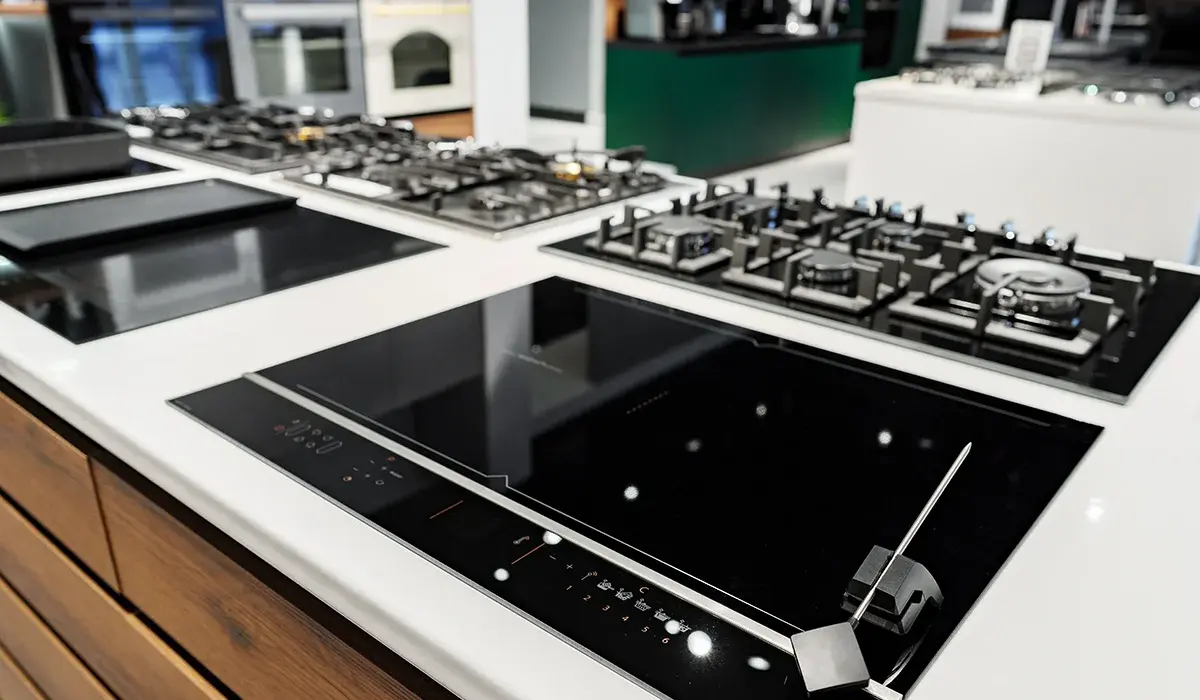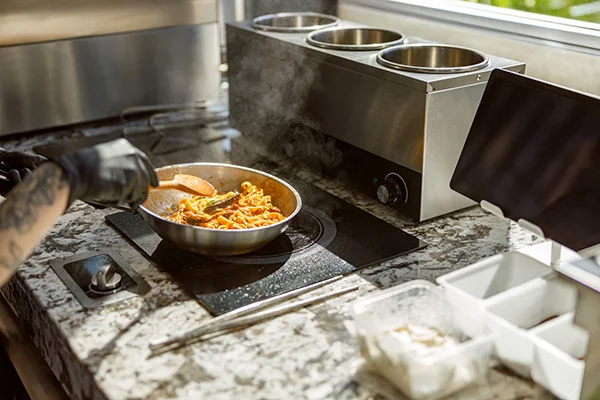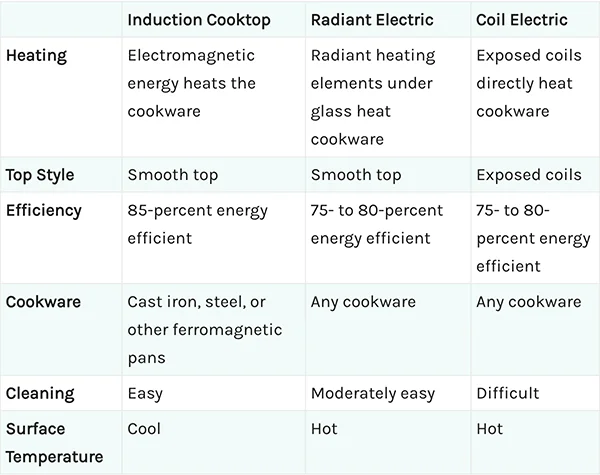Kitchen
Induction or Electric Cooktop: What’s Right for You?

Induction vs Electric Cooktops: Which is the Best Option for Your Kitchen?
When choosing a cooktop for your kitchen, the debate between Induction vs Electric Cooktops can be overwhelming. While both offer electric-powered cooking options, they have distinct differences in terms of efficiency, cost, and performance. This article will dive into the features, benefits, and drawbacks of each, helping you decide which is better suited for your needs.
What Are Induction and Electric Cooktops?
Before we compare Induction vs Electric Cooktops, it’s essential to understand how each one works. Induction cooktops use electromagnetism to generate heat directly in the cookware, while electric cooktops rely on heated coils or elements beneath the cooking surface.
How Induction Cooktops Work

Induction cooktops create a magnetic field beneath the cookware, which makes the pan itself heat up. The cooktop remains cool, and there are no exposed coils or flames. Only ferrous materials, such as cast iron and some stainless steel, are compatible with induction cooking.
How Electric Cooktops Work

Electric cooktops come in two types: radiant and coil. Both types use electric coils or elements to generate heat.
- Radiant Cooktop: These cooktops have heated electric coils beneath a smooth ceramic glass surface, which transfers heat to the cookware.
- Coil Cooktop: Coil cooktops have exposed metal coils that heat up directly to cook food.
Power Requirements for Both Cooktops
Both Induction vs Electric Cooktops require a power supply of 220/240V electricity. However, portable two-burner versions may operate on 120V.
Cookware Compatibility
Induction cooktops require specific cookware—only ferrous materials such as cast iron or magnetic stainless steel will work. In contrast, electric cooktops can use any type of cookware, including aluminum, copper, and glass.
Cleaning: Induction vs Electric Cooktops
Cleaning is a crucial factor when choosing between Induction vs Electric Cooktops. Induction cooktops are easier to clean due to the cooler surface, which prevents food from baking onto the cooktop. Radiant cooktops are also relatively easy to clean but may have fused spills. Coil cooktops, however, are harder to clean because of the exposed coils and drip pans.
Cleaning Induction Cooktops
Induction cooktops have a smooth, glass surface, making them easy to wipe clean. For tougher stains, use a ceramic cooktop cleaner.
Cleaning Electric Cooktops
- Radiant Cooktops: The ceramic glass is easy to wipe down, but spills can be tricky if left to bake on.
- Coil Cooktops: Coils can be removed and soaked, but cleaning the exposed metal coils and drip pans is more cumbersome.
Safety: Induction vs Electric Cooktops
Induction cooktops are generally safer than electric cooktops. Since the cooktop remains cool, there’s less risk of burns or fires. Electric cooktops, especially radiant and coil models, can stay hot long after they’ve been turned off, posing a safety risk.
Durability and Costs
Durability varies with each cooktop type. Coil electric cooktops tend to last the longest, as they have no glass surface that can crack. However, they can be less aesthetically pleasing. Induction cooktops are the most expensive but offer the best energy efficiency and performance. Radiant electric cooktops fall in the middle in terms of price and performance.
Costs of Cooktops
- Induction Cooktops: Induction cooktops typically cost between $900 and $2,000.
- Radiant Electric Cooktops: These cooktops range from $550 to $1,200.
- Coil Electric Cooktops: These are the most affordable, with prices ranging from $350 to $650.
Pros and Cons of Induction vs Electric Cooktops
Pros of Induction Cooktops
- Cool cooktop: The cooktop remains cool during cooking.
- Fast cooking: Induction cooktops heat up quickly and cook food faster.
- Energy efficient: They are more energy-efficient, with up to 85% of the electricity being used to cook the food.
- Easy to clean: The smooth surface makes cleaning a breeze.
Cons of Induction Cooktops
- Cookware limitations: Only ferrous cookware works.
- Scratch risk: The glass top can scratch.
- High cost: Induction cooktops are more expensive than electric ones.
- Noise: Some users find the low hum during operation annoying.
Pros of Electric Cooktops
- Affordable: Electric cooktops are less expensive than induction models.
- Energy-efficient: They still save energy compared to gas cooktops.
- Easy installation: They are simple to install in most kitchens.
- Versatile cookware: Electric cooktops can use all types of cookware.
Cons of Electric Cooktops
- Slow heat time: Electric cooktops take longer to heat up than induction models.
- Uneven heat: The heat can fluctuate, leading to uneven cooking.
- Heat retention: Electric cooktops remain hot for a long time after being turned off.
- Cleaning difficulty (coil models): Coil models are harder to clean.

Which Cooktop Is More Energy Efficient?
Induction cooktops are the clear winner when it comes to energy efficiency. They convert more electricity into cooking heat—about 85% of the energy is used to cook the food. In contrast, electric cooktops only use about 75-80% of the energy for cooking.
Energy Efficiency of Induction Cooktops
Induction cooktops use electromagnetism, which makes them more efficient, reducing heat loss.
Energy Efficiency of Electric Cooktops
Electric cooktops are still more energy-efficient than gas, but they are less efficient than induction cooktops.
How to Choose Between Induction and Electric Cooktops
When deciding between Induction vs Electric Cooktops, consider the following factors:
- Budget: Induction cooktops are more expensive upfront, but they may save money in energy costs over time.
- Cookware: If you already own induction-compatible cookware, it’s worth considering an induction cooktop.
- Cooking style: Induction cooktops offer precise temperature control, making them ideal for those who do a lot of cooking.
Conclusion: Induction vs Electric Cooktops – Which Is Right for You?
Both Induction vs Electric Cooktops offer distinct advantages. If you’re looking for speed, energy efficiency, and safety, an induction cooktop is a great choice. However, if you have a limited budget or prefer using a variety of cookware, an electric cooktop may be more suitable. Ultimately, your decision depends on your cooking habits, kitchen needs, and budget.
For more insights and tips on kitchen appliances, explore more news on this website!
